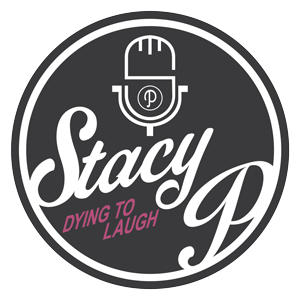
I stumbled into becoming a funny speaker by complete accident. I have learned A LOT along the way. What I learned-I actually already knew. Let me explain:
I have a degree in theatre. What I learned and even taught when it came to theatre/acting performance, audience, communication, messaging, etc., has translated perfectly to the speaking world. All the rules seem to hold true for either mode of communication-acting or speaking.
It’s taken making a whole lot of mistakes and performing a loooot of really tough gigs to finally embrace who I am. I’m a performer with a message.
I’ve done free speaking gigs, drove hours for almost no-paying gigs, done back alley gigs, comedy gigs, county fair gigs, festival gigs. My cars broke down. Someone slipped something in my drink the last comedy club I performed at. I’ve traveled 12 hours one way to have the company never pay me. Been snowed in, iced in, dust-stormed in. (I choked on-stage during the dust storm-literally. I coughed and gagged on the dirt so much, I had to walk off after only 8 minutes.) I’ve bombed on stage. I’ve killed it-and a whole lot of in-between.
Now that you know some of my creds-here’s some huge mistakes from an actor’s perspective, I see other speakers make on stage. I’ve done several of these myself.
- Not Thinking from the Audience’s Perspective

The mistake I see when I watch a lot of speakers is they are not aware of how they look, the way they are being experienced, or even the appropriate messaging from the audience’s point of view.
When you act on stage, you usually have a director. The director sits in the audience and “blocks” the actors (tells them where to move on stage) from the audience’s point of view. Everything is about the audience. Who they are. Where they are seated. How the performer looks to them on stage. The feelings, message, and story they are experiencing and seeing. The staging is based on the audience-NOT the actor.
As a speaker, your staging should not be based on you.
-Do you know your sight lines?
-Have you checked points of view from various audience seats to see what they are seeing?
(Are the people seated house right blocked by the podium? The people seated in the front row blocked by a giant balloon bouquet used as set decoration?)
-Are you remaining in an open body position for the audience to be able to see your face regardless of where they sit? (Your shoulder is your guide. Anyone seated behind your shoulder won’t see your face.)
Helpful tip and an acting rule of thumb: If you can see the audience-they can see you. If you can’t see the audience’s faces-they can’t see you.
-Is your movement boring? Do you simply pace back and forth? Do you utilize stage levels?
-Do you know where the lighting hot spots and low spots are if you are utilizing a fully produced stage?
In addition, when it comes to appropriate messaging from your audience’s point of view, you wouldn’t perform a nude version of “The Wizard of Oz-The Musical” to elementary kids. Nor would you perform “Our Town” to drunk men at an 11:00 pm comedy show in a sports bar.
Here’s a subtler example. I watch A LOT of speakers on-line. (I’m a bit of a study-a-holic.) Last night a particular speaker who is well known and very good, posted a video clip discussing funny stuff about hotels. But not just any hotel-nice hotels. Here’s the problem. This speaker’s life is on the road. It’s what this person knows. To 90+% of this speaker’s audience-it doesn’t resonate. Most people don’t stay at high end hotels. Therefore-it wasn’t funny. It didn’t hit as a good example.
When it comes to humor in general, I learned a great rule of thumb from Rik Roberts who teaches a lot of comedy. (He has a great podcast, and is genuinely a wonderful human being in real life. http://rikroberts.com/school-of-laughs/)
His definition of an ideal audience for humor is: same gender, 10 years above your age to 10 years below your age. I find this to be EXTREMLY true. I don’t do a lot of gigs that are all young people or mostly men since my speaking is humor based. Women love me, men are…confused… Think about your favorite comedian. Most of the time they fall within that same criteria for yourself.
Also-as a side note-ENOUGH OF THE SPORTS JOKES AND SPORTS STORIES. As a woman, it is so tiring and sometimes polarizing. I don’t care about sports. If you have a lot of women in your audiences-think twice before starting out about the latest game or throwing in a moving sports analogy unless that’s your niche. It’s SO overdone by male speakers.
Finally, understand your audience emotionally. This seems to get missed a lot. When you are sharing your speech, it’s not about the stats. Take them on an emotional journey instead. Some speakers seem to miss when their audience is getting squirmy, bored, or plain checked out.
Think of a great film. There’s slow spots, intense spots, funny spots. The same is true with a really great song ballad. There’s low and slow and all out belting at certain portions of the song. They both take you on an emotional roller coaster ride. Plan your speech around the emotions you want your audience to experience. We call this “levels” as actors. You don’t start out a fight scene at 100% screaming because there’s nowhere to take your audience emotionally. You also don’t keep it at an even tempo and pace for an entire hour.
This is a terrible example, but since I wrote it I own the rights so I can post it. Below is an acting scene I did with fellow gifted comedian, Dan Davidson. (Sound and cameras are AWFUL. It was for an acting exercise so NOT produced for the public.) The emotional journey I wrote was not for my character but for Dan’s. If you choose to watch it, pay attention to how Dan’s character changes the way you-the audience- feels comparing the beginning to the end.
What does this have to do with your speaking? Are you setting up an emotional ride to keep your audience engaged? Humor, stats, interaction, compelling stories? Are you taking them from point A to point Z in order to garner their attention and help them absorb your point?
- Flubbing the Opening.
Killer opening is why I find most “Ted Talks” to be amazing. They use a “hook” to grab your attention. They don’t waste time thanking people, etc. This is great…in theory.
We all wish for the giant stage with lights and the “Voice of God” announcer reading our bio and then entering upon thunderous applause, raucous music, fabulous video footage that’s displays our fame, and a captivated audience.
The reality is most of us will experience being the only speaker in a plain room which means it’s our responsibility to grab the audience’s attention and get them settled in. If we have someone introducing us, they often are not gifted at it and merely ramble off a few announcements or just read our bio.
If you walk out and give your killer Ted Talk opener, the audience may not be ready yet.
Once again, think of it from the audience’s point of view. They may be just coming in from a break, they are stressed, getting settled, spilling coffee, saying “hi” to the stranger sitting next to them.
If you waltz out and pounce with a line like, “I never thought I’d see him again, until the doors parted and there he stood, my father, only he wasn’t really my father”…or worse yet, “Today I’m going to be talking about proper ink distribution from various laser printers. Research shows……” and the audience is still talking, unseated, or just plain not ready-it’s a disaster for everyone.
Most plays or films don’t start out with a killer line the moment an audience is seated, nor do they start with an Academy or Tony Award acceptance speech thanking everyone for this moment. There’s intro’s, music, things put into place to lure the audience in.
Here’s what I recommend. Think of entering someone’s home for dinner. It’s super awkward to walk in and have them come out and immediately begin praying over the meal while you’re standing in the doorway. Instead, you’d prefer to be welcomed, escorted in, shown to your seat, the menu explained and THEN pray. It’s more hospitable. Hospitality. You want your audience to feel welcome and wanted.
I usually have 2 openers prepared. One I create AT the event if it’s a conference. And then I have my “Ted Talk” opener. This way if the audience is ready-I can launch with my Ted X brilliance…or I can ease them in.
Easing them in DOES NOT MEAN ANNOUNCEMENTS, or the “every conference has to have a cheesy get up, clap and dance moment”. As an introvert, I’m also not a huge fan of games in the beginning for three reasons:
-I don’t trust you-the speaker -yet
-I’m not settled and ready to “socialize”. AKA I don’t have my guard down.
-People use a lot of the same games. If the audience has seen it before, it sets you up as being cheesy or old school.
Instead I use:
-Self-effacing humor
-Humor based on what they are experiencing that day from other speakers, food, anything that’s been happening around them
-A funny story that is ok if they miss the opening line or two but has a strong ending
-My first few power point slides make fun of me and display a little of who I am. I’ve also used fake power point slides that are funny and give false stats about the audience, me or what to expect over the next hour.
-My bio is funny, so if it’s read by someone else, it starts to capture the audience’s attention
Basically, I’m trying to get them to let their hair down a little and settle in.

- “Breaking Character” When Things Go Wrong
It’s our job as speakers to take care of the audience and always put them at ease-no matter what is happening on stage-back stage, back of the house, etc. DON’T FREAK OUT or be thrown when the power point doesn’t work, you lose your place, you forget a point, your pants button flies off, you fall off the stage…
In acting, it’s called “Breaking Character”. That’s bad. A very bad thing. Crazy things happen. Some things you can prepare for. Others you can’t. If you speak enough you know inevitably you’ll have problems with a mic, your power point, being forgetful, and yes-falling off the stage. You can prepare by having a plan b-another words some pre-written lines, games, statements, etc-to keep the audience at ease, as you work to fix those things.
The things you can’t prepare for, you need to immediately keep the audience’s best interest at heart. A lot of times it means NOT acknowledging the fact you forgot a point because they most likely don’t know. There’s another saying in theatre, “From the back of the house on a galloping horse.” It means that if you can’t see it from behind the audience on a galloping horse, they audience won’t notice it either.
Although, if your pants button flies off and smacks someone in the face, PLEASE DO acknowledge it. The same is true for knocking over a water glass, or anything else that is going to bug the OCD audience members (aka me) because it’s all they will stare at or think about for the remainder of the speech. “Act” like it’s no big deal, fix it, and move on.
If it is a big deal, like someone passing out in the audience, you need to remain calm, acknowledge the situation and direct the audience to stay seated, etc. Be calm, caring, take charge. Your audience is your responsibility NOT the meeting planners or people in the room. YOU have their attention so YOU need to be the voice. It’s a good idea to pay attention to where exit signs are, help desk, security place, etc. I’m weird in that I actually read the fire escape routes and know where the stairs are. Why? I’ve been on stage when these things have happened from fire alarms, to strokes, and it’s not fun. The more prepared the better.
- Not Modifying Last Minute for Audience Size
Once again, we’d all love the huge stage with throngs of elated audience members, but things don’t always turn out as planned. As a humorist, I’ve learned to ask how many attendees are expected. If it’s less than 30, I won’t do it unless it’s an acting workshop type thing. Comedy needs energy-audience energy. 
I’ve seen several speakers in concurrent sessions not adjust when only a handful of people show up. They’ll be 3 to 5 scattered people in a room with 100 chairs. The speaker stands and delivers just as prepared.
I don’t recommend this. First, move the audience up and together. Second, if at all possible, adjust your delivery style. Make it a discussion panel, a hands-on practice thing. Sit in a circle. Do whatever you can to get them involved. Ask them what would be the most helpful to them since it’s more a one on one session. Then adjust. It’s weird to sit in an audience with only a few people and have a speaker deliver without acknowledging the huge elephant in the room-aka-no audience. Remember it’s not about you. You’re not there for you. You’re there to help them solve a problem. Find out the best way to do that-even if it means not standing on a stage.
- Being a Jerk
There’s two parts to this from an acting point of view.
The first is, no matter what your character is, I was taught to always make the audience root for you. The show “Breaking Bad” (my all-time favorite) was brilliant at this. They somehow made the audience root for Walt-a drug dealing, lying, murderer. You want the audience to root for you. If you come out with an attitude, knock other people, yell at the sound guy, tell someone in the back row to shut up and pay attention – no one is rooting for you. They don’t like you. You’re an a**.
Be careful not to use humor at someone else’s expense. Be careful in the way you talk or critique other people in the industry, countries, anything that has to do with your talk. You don’t need to put other people’s ways of doing things down to make yours look better. You can point out flaws in identifying problems or the way people are approaching a problem without being a jerk. It’s all in the wording or the delivery.
I know there are a few speakers who have carved out a niche of having a “character” that is a jerk-tells it like it is. If that’s how you are marketing and want to be seen, then go for it. However, most of us are not going for that “persona” so be careful.
The second part to this is, no one wants to work with a jerk. One thing I have noticed that is similar between high level-getting lots of work-actors AND speakers, is they are genuinely nice people. Humble. Hard working.
The very first leading role I ever received, the director pulled me aside and had a “chat”. He told me he was taking a risk on me, as the actress I was “competing” against was well known and very good. She would have been a no brainer. However, he went with me because he said he saw something in me AND he didn’t like how she behaved off stage. He went on to explain that someone with a lead role sets the tone for the entire cast. If you are snotty, you’ll cause rifts within the cast. If you are a servant leader, you have the power to unify.
As I went on in acting I discovered it wasn’t just this director that felt that way. Many actors got re-booked or were in demand even though there were other, more talented individuals. Directors would rather work with someone solid, who will work hard, take direction, and be a positive force on a set, compared to an off the charts talented individual who is a nightmare off camera.
Be a servant leader. Events are stressful. Everyone’s roles are equally important, from the server handing out the food to the sound guy to you. Yes, you. You are no more important. The better everyone works together and helps each other out, the better the event will go. That’s a win-win for everyone. Not convinced? Here’s a shocker. When it comes to actors-we are the last thing that is thought of when it comes to commercials, film, etc. Everything else is put into place and thought out first. We’re the icing on the cake-not the actual cake or cake stand. We are the least important, last thought of person in most productions. That’s why we get calls a day before an audition and then expected to shoot the next day or two when we’re chosen, even though it’s been in production for a long long time.
STILL not convinced? Yes, the speaker has the power to make an event memorable. But try delivering an amazing speech with no sound, hungry attendees, or no agenda. You aren’t amazing because of you. You’re amazing because of everyone else helping you look amazing. So don’t be a jerk. Help clear a table, thank the sound guy, and stay late to clean up.
All right. My rear end is being a jerk because I’ve been sitting too long writing this post. Forgive the miss spellings and hope this helps you in some way.
Remember this is your one and only life. So live it, by giving of it, well.
Kindly, Stacy P.
Stacy Pederson is a funny speaker who’s claim to fame is almost dying a bunch. To learn more about her, watch the videos below and check out her website at: StacyPederson.com




